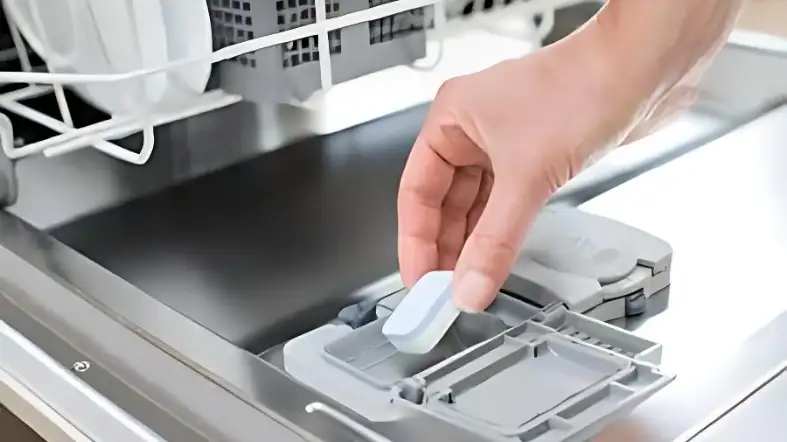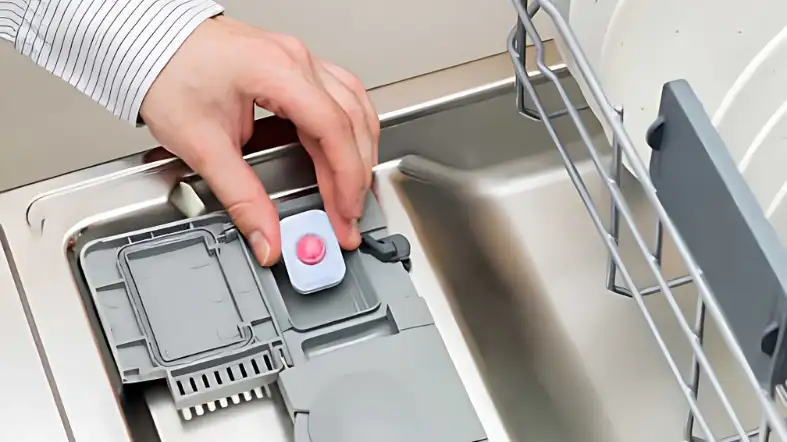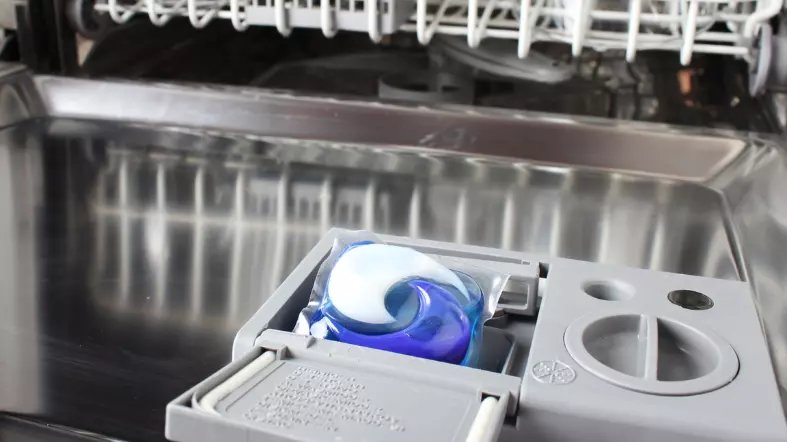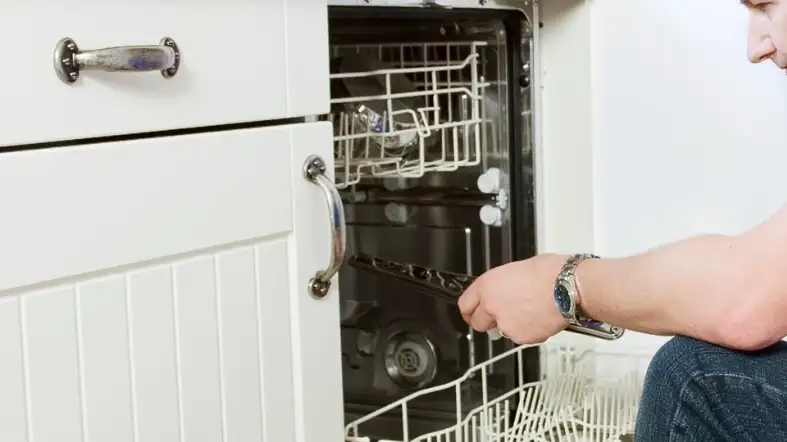Are you frustrated with soap residue on your dishes after a dishwasher cycle? Wondering why your Bosch dishwasher isn’t dissolving soap as it should?
In this engaging guide, we’ll delve into practical solutions and step-by-step instructions to fix this common issue.
Clean up unsightly residue and leave dishes sparkling with our expert tips!

Is your Bosch dishwasher not dissolving soap?
Yes, a clogged spray arm or incorrect detergent may prevent your Bosch dishwasher from dissolving soap. Cleaning the spray arms and using the appropriate detergent can resolve the issue.
Benefits of Using Bosch Dishwashers
Bosch dishwashers are known for their high quality, performance, and energy efficiency. Here are some of the benefits of using Bosch dishwashers:
Water Efficiency
Bosch dishwashers are champions in water efficiency, utilizing as little as 6.5 liters of water per cycle. It reduces water waste and conserves the environment compared to handwashing.
It’s not just about sparkling clean dishes with Bosch, it’s also about water conservation.
Energy Efficiency
Designed for sustainability, Bosch dishwashers consume as little as 0.68 kWh per cycle. This eco-conscious design not only lowers your utility bills but also reduces your carbon footprint.
The Bosch dishwashing machine contributes to a greener world while providing convenience.
Hygienic Cleaning
High-temperature washing and powerful water jets make Bosch dishwashers exceptionally clean. The combination removes stubborn stains and eliminates germs and bacteria from your dishes.
HygienePlusTM provides an extra layer of security, making your dishes hygienically safe as well.
Convenient Usage
Bosch dishwashers offer unrivaled convenience with their array of customizable features. Adapt wash cycles to your specific needs, from delicate glassware to heavily soiled pots and pans.
Make your dishwasher start later during off-peak hours to conserve energy. A load size sensing feature intelligently adjusts water and energy usage based on the size of your load.
Durability
Investing in a Bosch dishwasher means investing in quality and longevity. The materials and components used in Bosch appliances are of high quality, ensuring durability and reliability.
With Bosch dishwashers, your investment is protected for years to come by extended warranties.
Bosch appliances are built to last, providing exceptional performance and efficiency for years to come.
Factors Affecting Soap Dissolution in Bosch Dishwashers

There are a few factors that can affect the dissolution of soap in Bosch dishwashers. These include:
The Type of Soap
When it comes to soap selection for your Bosch dishwasher, the type of detergent matters. Unlike liquid detergents, powder detergents dissolve more efficiently.
Detergent gels may not dissolve completely, leaving behind an unsightly residue. Powder detergents offer superior dissolving power to avoid soap residue problems.
The Amount of Soap
Believe it or not, using too much soap can hinder the dissolution process in your Bosch dishwasher. Even though excessive soap seems counterintuitive, it can lead to inefficient cleaning.
Following the detergent packaging’s dosage recommendations will ensure optimal results. Use the right amount and the dishwasher will dissolve the soap, leaving your dishes spotless.
The Water Temperature
A crucial element in the soap dissolution equation is water temperature. For Bosch dishwashers to operate at their peak, a minimum water temperature of 120°F (50°C) is required.
This heat not only aids in dissolving the soap but also ensures thorough cleaning of your dishes. Setting your water heater to the right temperature will ensure a seamless dishwashing process.
The Water Pressure
Water pressure plays a pivotal role in how well the soap dissolves and ultimately cleans your dishes. A powerful dishwasher ensures that the soap reaches every corner, thoroughly cleaning every dish.
If the water pressure is too low, the soap may struggle to reach all the dishes, leading to subpar results. Verify the water pressure in your Bosch dishwasher to ensure thorough and effective cleaning.
The Condition of the Dishwasher
If you want your Bosch dishwasher to perform at its best, it’s important to maintain it carefully. Keep the dishwasher clean to prevent dirt and debris buildup, which will obstruct water flow.
Filters and spray arms should be cleaned regularly to prevent clogs, which adversely affect water flow. Maintaining a clean dishwasher ensures sparkling clean dishes after every wash cycle.
Common Symptoms of Dishwasher Soap Dissolving Problems

Here are some of the most common symptoms associated with dishwasher soap dissolving issues
Dishes are not clean
Dishwasher soap dissolving problems are evident when dishes are still dirty and grimy after washing. The soap doesn’t dissolve properly in the dishwasher, leaving stubborn stains and food particles behind.
This can be frustrating and defeats the purpose of using a dishwasher for efficient cleaning.
Soap residue on the dishes
After your dishwasher is finished cleaning your dishes, you may see soap residue left on them. Your glassware and plates may appear cloudy if the soap didn’t fully dissolve during washing.
As well as compromising the cleanliness of your dishes, residue can also affect their appearance.
The dishwasher smells bad
It may be an indication of soap residue buildup inside your dishwasher if you detect a foul odor. Soap remnants can accumulate in the dishwasher’s filter, spray arms, and drainage system over time.
It indicates the need for thorough cleaning and proper maintenance to resolve the dissolving issue.
No water in the dishwasher
In the event that a dishwasher cycle does not fill up with water, this is a significant concern. A water inlet valve provides water to the dishwasher to facilitate cleaning.
Clogged or malfunctioning valves prevent the dishwasher from dissolving soap and cleaning dishes properly.
The dishwasher is not circulating water
During a dishwasher cycle, the pump circulates water throughout the appliance. Misfunctioning pumps can disrupt water circulation, making soap harder to dissolve and distribute evenly.
Thus, your dishes may not receive adequate cleaning, and soap residue may linger on the surfaces, causing dissatisfaction.
How to Troubleshoot and Fix the Issue: A Step-by-Step Guide

Here are the steps on how to troubleshoot and fix the issue of dishwasher soap not dissolving:
Step 1: Check the Type of Soap
Verify the type of detergent you are using before troubleshooting dishwasher soap dissolving issues. Ensure that you’re using a dishwasher-specific detergent designed explicitly for automatic dishwashers.
Dishwashing soaps or other cleaning agents are not designed to dissolve effectively in dishwashers.
Step 2: Check the Amount of Soap
Using the right amount of dishwasher detergent is crucial for proper soap dissolution. Always follow the recommended dosage instructions provided on the detergent’s packaging.
When detergent is used excessively, it creates excess suds that prevent soap from fully dissolving.
Step 3: Check the Water Temperature
The water temperature plays a significant role in soap dissolution and effective dishwashing. Check that your dishwasher’s water temperature reaches at least 120°F (50°C) during the wash cycle.
Water breaks down detergent, ensuring it dissolves and activates to thoroughly clean dishes.
Step 4: Check the Water Pressure
Water pressure is essential for soap to reach all areas of the dishwasher and dissolve effectively. Low water pressure indicates a problem with the dishwasher’s water supply, hindering soap dissolution.
In such cases, consider checking the water inlet valve and consulting a professional if needed.
Step 5: Clean the Dishwasher
Regular maintenance and cleaning of your dishwasher are vital to prevent soap dissolving issues. Debris, food particles, and minerals build up in the dishwasher’s filters and other components, obstructing water flow.
Clean the dishwasher interior, filters, and spray arms regularly to maintain optimal performance.
Step 6: Check the Soap Dispenser
When soap dispensers are clogged or malfunctioning, soap does not dissolve as well. Make sure the soap dispenser opens and releases detergent at the right time during cleaning.
Clean any residue or debris around the dispenser area to prevent obstruction.
Step 7: Check the Water Inlet Valve
The water inlet valve is responsible for supplying water to the dishwasher during the wash cycle. This valve can malfunction or clog, disrupting water flow and preventing soap from dissolving.
Ensure the water inlet valve is functioning correctly and replace it if necessary.
Step 8: Check the Pump
The dishwasher’s pump circulates water throughout the appliance during the wash cycle. Water circulation can be affected by a malfunctioning pump, impairing soap dissolution.
Verify that the pump is working correctly and seek professional assistance for any pump-related issues.
FAQs on Bosch Dishwasher Soap Dissolving Issues Explained
What Type Of Detergent Should I Use?
Automatic dishwasher detergents are specifically designed for optimal performance and soap dissolution.
Use dishwasher-safe dishwashing soaps instead of hand soaps, which may leave soap residue on your dishes.
What Is The Recommended Detergent Dosage?
Always follow the recommended dosage instructions provided on the detergent’s packaging.
When you use too much detergent, you can create excess suds and prevent proper dissolution.
Adhering to the recommended dosage ensures efficient cleaning and avoids soap residue buildup.
Why Are My Dishes Still Dirty After A Cycle?
Dishes that don’t come out clean after a dishwasher cycle may indicate improper soap dissolving.
Dishes may be left with food particles or residue due to incomplete dissolution of detergent.
Check and address the factors affecting soap dissolution to ensure sparkling clean dishes.
How Can I Ensure Proper Soap Release?
Make sure the soap dispenser is not clogged or obstruction-free during the wash cycle.
It can affect soap dissolution if detergent is not released at the right time during cleaning.
Clean any residue or debris around the dispenser area to maintain smooth soap release.
Conclusion
You can troubleshoot and fix the issue if your Bosch dishwasher is not dissolving soap effectively. Ensure you’re using the right dishwasher-specific detergent and following the recommended dosage.
Check the water temperature, pressure, and keep your dishwasher clean for optimal performance. Remember, taking care of these factors will ensure your dishes come out spotless after every cycle.
With Bosch dishwashers, dishwashing is hassle-free, and soap residue is a thing of the past.
